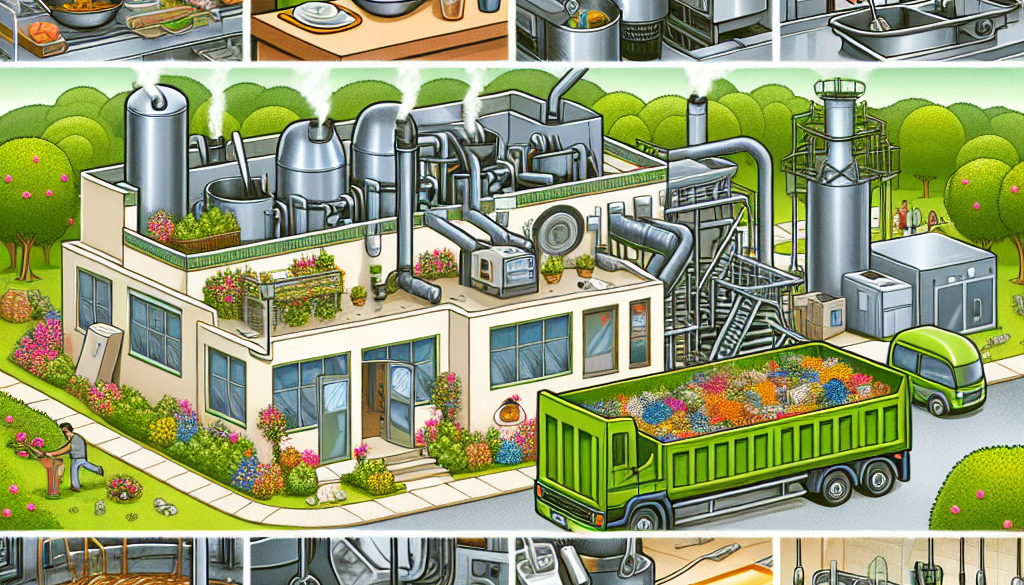The Green Side of Recycling Used Cooking Oil
-
Table of Contents
- Recycling Used Cooking Oil: Unveiling the Green Benefits
- The Environmental Impact of Improper Disposal
- Recycling Used Cooking Oil: A Sustainable Solution
- From Waste to Resource: The Lifecycle of Recycled Cooking Oil
- Green Energy: Biofuels from Used Cooking Oil
- Reducing Carbon Footprint with Recycled Cooking Oil
- Innovative Uses of Recycled Cooking Oil
- Economic Advantages of Recycling Cooking Oil
- Global Efforts in Cooking Oil Recycling
- How You Can Contribute to the Green Side of Recycling
- Conclusion: Embracing the Green Potential of Used Cooking Oil
- Discover ETprotein’s Sustainable Protein Products
Recycling Used Cooking Oil: Unveiling the Green Benefits

Recycling used cooking oil is not just a matter of disposing of waste responsibly; it’s a process that can have a profound impact on the environment and the economy. In this article, we will explore the green side of recycling used cooking oil, highlighting the environmental benefits, the innovative uses of recycled oil, and the positive effects on sustainability. With a growing awareness of the need to protect our planet, understanding the significance of this recycling process is more important than ever.
The Environmental Impact of Improper Disposal
Before delving into the benefits of recycling used cooking oil, it’s crucial to understand the consequences of improper disposal. When cooking oil is poured down the drain, it can solidify and cause blockages in sewage systems, leading to costly repairs and environmental contamination. Moreover, when disposed of in landfills, used cooking oil can contribute to the production of methane, a potent greenhouse gas.
Recycling Used Cooking Oil: A Sustainable Solution
Recycling used cooking oil presents a sustainable alternative that can mitigate these environmental issues. The process involves collecting, filtering, and treating the oil so it can be repurposed for various uses. This not only prevents the negative impacts of improper disposal but also conserves resources by giving the oil a second life.
From Waste to Resource: The Lifecycle of Recycled Cooking Oil
The journey of used cooking oil from a waste product to a valuable resource involves several steps. After collection, the oil is filtered to remove food particles and other debris. It is then processed and purified to meet the standards required for its new applications. This lifecycle underscores the transformation of what would be waste into a commodity with real-world applications.
Green Energy: Biofuels from Used Cooking Oil
One of the most significant uses of recycled cooking oil is in the production of biofuels. Biofuels made from used cooking oil are a cleaner alternative to fossil fuels, as they produce fewer greenhouse gases and pollutants. According to the U.S. Energy Information Administration, biodiesel and renewable diesel production from waste oils, fats, and greases has been steadily increasing, highlighting the growing role of recycled cooking oil in green energy initiatives.
Reducing Carbon Footprint with Recycled Cooking Oil
By using recycled cooking oil for biofuel production, we can significantly reduce our carbon footprint. Statistics show that biodiesel produced from used cooking oil can reduce greenhouse gas emissions by up to 86% compared to petroleum diesel. This reduction is a major step towards combating climate change and promoting a more sustainable future.
Innovative Uses of Recycled Cooking Oil
Beyond biofuels, recycled cooking oil has found its way into various innovative applications. These include:
- Industrial lubricants and hydraulic oils
- Animal feed additives
- Personal care products like soaps and cosmetics
- Algae cultivation for bio-products
Each of these uses contributes to a circular economy, where waste is minimized, and resources are used more efficiently.
Economic Advantages of Recycling Cooking Oil
The recycling of used cooking oil also offers economic benefits. It creates jobs in the collection and processing sectors and provides a cost-effective raw material for industries that produce biofuels and other products. This economic incentive encourages businesses and consumers alike to participate in recycling programs.
Global Efforts in Cooking Oil Recycling
Countries around the world are recognizing the importance of recycling used cooking oil. In the European Union, for example, there are directives in place that promote the collection and use of waste oils for energy recovery. These efforts not only support environmental goals but also help in meeting renewable energy targets.
How You Can Contribute to the Green Side of Recycling
Individuals and businesses can contribute to the green side of recycling used cooking oil by:
- Participating in local cooking oil recycling programs
- Ensuring proper storage and disposal of used cooking oil
- Choosing products made from recycled cooking oil
- Supporting businesses that practice sustainable waste management
By taking these steps, we can all play a part in promoting a greener, more sustainable world.
Conclusion: Embracing the Green Potential of Used Cooking Oil
In conclusion, recycling used cooking oil offers a multitude of green benefits that extend far beyond simple waste management. From reducing our carbon footprint to creating new economic opportunities, the potential of this recycling process is vast. By understanding and supporting the lifecycle of recycled cooking oil, we can contribute to a more sustainable and environmentally friendly future.
Discover ETprotein’s Sustainable Protein Products
As we embrace sustainability in our daily practices, choosing products from companies that prioritize eco-friendly processes is essential. ETprotein is one such company, offering a range of organic bulk vegan proteins and L-(+)-Ergothioneine (EGT) that align with the values of sustainability and health. Their products, including various plant-based proteins and high-purity EGT, cater to diverse industries while ensuring environmental responsibility.
About ETprotein:
ETprotein, a reputable protein and L-(+)-Ergothioneine (EGT) Chinese factory manufacturer and supplier, is renowned for producing, stocking, exporting, and delivering the highest quality organic bulk vegan proteins and L-(+)-Ergothioneine. They include Organic rice protein, clear rice protein, pea protein, clear pea protein, watermelon seed protein, pumpkin seed protein, sunflower seed protein, mung bean protein, peanut protein, and L-(+)-Ergothioneine EGT Pharmaceutical grade, L-(+)-Ergothioneine EGT food grade, L-(+)-Ergothioneine EGT cosmetic grade, L-(+)-Ergothioneine EGT reference grade and L-(+)-Ergothioneine EGT standard. Their offerings, characterized by a neutral taste, non-GMO, allergen-free attributes, with L-(+)-Ergothioneine purity over 98%, 99%, cater to a diverse range of industries. They serve nutraceutical, pharmaceutical, cosmeceutical, veterinary, as well as food and beverage finished product distributors, traders, and manufacturers across Europe, USA, Canada, Australia, Thailand, Japan, Korea, Brazil, and Chile, among others.
ETprotein specialization includes exporting and delivering tailor-made protein powder and finished nutritional supplements. Their extensive product range covers sectors like Food and Beverage, Sports Nutrition, Weight Management, Dietary Supplements, Health and Wellness Products, and Infant Formula, ensuring comprehensive solutions to meet all your protein needs.
As a trusted company by leading global food and beverage brands and Fortune 500 companies, ETprotein reinforces China’s reputation in the global arena. For more information or to sample their products, please contact them and email sales(at)ETprotein.com today.














